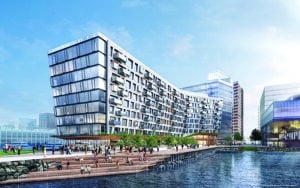
A 3,266-square-foot penthouse residence at Pier 4 in Boston’s Seaport District sold on June 11 for $15.2 million, or $4,654 per square foot. Image courtesy of Elkus Manfredi Architects
The city is bustling again. Traffic is back and parking throughout Boston’s garages is nearing capacity.
Restaurant patios are packed, and yet again high-demand dinner reservations need to be booked at least a week in advance. People want to spend time here, and they want to live amongst the energy and intellectual culture. The city’s population is currently at approximately 700,000, and according to the 2021 World Wealth Report Boston is on a path for continued growth as a hub of technology, innovation, and business.
The resiliency of the downtown Boston residential condominium market is currently evidencing itself, despite the devastation caused by the global pandemic and has again marched forward through a recession.
The recovery is on a much more efficient path when compared to the dotcom recession in 2000-2001, which derailed tech in a speculative bubble, and The Great Recession of 2009, when banks were either dissolved or needed to be recapitalized followed by extensive waves of foreclosures. But Boston recovered then, too. After essentially hitting pause midway through 2009, the city’s economy and residential market improved modestly throughout 2010, 2011 and 2012, and then dramatically from 2013 to 2021.
Fast forward to now, on the heels of the most recent crisis. Greater Boston’s biotechnology market was recently referred to as the Silicon Valley of biotech, and homes are selling at an impressive rate and prices downtown.
Sales Velocity Demonstrates Boston’s Appeal
According to Douglas Elliman’s research, the percentage of downtown cash sales has consistently achieved 20 to 40 percent of all condominium sales week to week, year to year throughout downtown Boston since the start of the last recession in 2008.
As of June 11, there were 1,665 closings year to date. This represents a 66 percent increase when compared to 2020 and we are only halfway through the year. These numbers are close to the record-breaking years of 2004 and 2005, when closings at this time throughout downtown Boston amounted to 1,758 and 1,703, respectively. The sales throughout 2004 and 2005 were ultimately 4,680 and 4,155, and this year is on track to achieve those figures.
Boston just broke a price-per-square-foot record with a Pier 4 resale in the Seaport. A 3,266-square-foot penthouse residence that closed on June 11, sold at $15.2 million, or $4,654 per square foot. Thus far in downtown, there have been eight sales at more than $4,000 square feet achieved in five different buildings.

Kevin Ahearn
The fundamentals underpinning downtown Boston residential real estate are arguably stronger than they have ever been. Boston is predominantly a user market with buyers looking to purchase a primary home in the city. The buyer profile is local to a very large degree, including financially conservative individuals who are not over leveraged, as well as dual-income couples and high-earning singles. There is also a large market for pied-à-terre-seekers and empty-nesters as people crave the excitement and convenience an urban atmosphere offers.
We will start to see new types of innovative luxury residential options emerge given this demand, such as Fortis Property Group’s 55 Lagrange St., which recently topped out. Buildings such as this with high-end finishes and amenities in sought-after locations with offerings that Boston has yet to experience will sell at a rapid rate.
Kevin J. Ahearn is CEO of Douglas Elliman Real Estate’s Massachusetts division.





